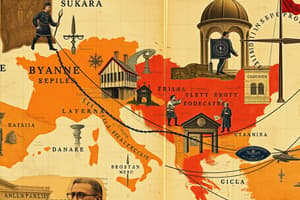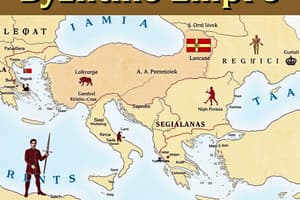Podcast
Questions and Answers
What is a notable characteristic of Byzantine empire churches?
What is a notable characteristic of Byzantine empire churches?
- Roofs covered with external materials
- Doors and windows with straight lines
- Walls with intricate mouldings
- Walls made of bricks, marble, and glass mosaics (correct)
Which architectural style influenced the design of religious buildings in Eastern Europe and the Middle East?
Which architectural style influenced the design of religious buildings in Eastern Europe and the Middle East?
- Romanesque architecture (correct)
- Gothic architecture
- Baroque architecture
- Renaissance architecture
What is a notable feature of the Hagia Sophia in terms of its roof?
What is a notable feature of the Hagia Sophia in terms of its roof?
- Domes with external coverings
- Domes placed over triangular pendentives
- Large domes in centralized spaces
- Domes with no external covering usually placed over square/octagonal pendentives (correct)
Which architectural style is associated with the use of minarets and the fusion of Islamic and Christian elements?
Which architectural style is associated with the use of minarets and the fusion of Islamic and Christian elements?
What is a key influence of Romanesque architecture on military architecture?
What is a key influence of Romanesque architecture on military architecture?
Which architectural style is characterized by the absence of mouldings in church walls?
Which architectural style is characterized by the absence of mouldings in church walls?
During which period of Byzantine architecture was the Hagia Sophia constructed under Emperor Justinian I?
During which period of Byzantine architecture was the Hagia Sophia constructed under Emperor Justinian I?
Which feature became common during the Middle Period (9th-11th centuries) of Byzantine architecture?
Which feature became common during the Middle Period (9th-11th centuries) of Byzantine architecture?
In which period did Byzantine architecture experience a revival blending Western European and Islamic features?
In which period did Byzantine architecture experience a revival blending Western European and Islamic features?
Which architectural plan is characterized by a cross-shaped plan with equal length arms in Byzantine architecture?
Which architectural plan is characterized by a cross-shaped plan with equal length arms in Byzantine architecture?
Which period of Byzantine architecture focused on making centralized spaces with domes and the common use of colorful mosaics?
Which period of Byzantine architecture focused on making centralized spaces with domes and the common use of colorful mosaics?
What is the main characteristic of the nave in a basilica?
What is the main characteristic of the nave in a basilica?
What architectural feature forms a cross-shaped floor plan in some basilican churches?
What architectural feature forms a cross-shaped floor plan in some basilican churches?
Which architectural style is characterized by simplicity and functionalism?
Which architectural style is characterized by simplicity and functionalism?
In which century did the Byzantine era begin according to the text?
In which century did the Byzantine era begin according to the text?
Which basilica in Rome is known for possessing Early Christian Architecture styles?
Which basilica in Rome is known for possessing Early Christian Architecture styles?
Which architectural era was influenced by Early Christian architecture according to the text?
Which architectural era was influenced by Early Christian architecture according to the text?
Flashcards are hidden until you start studying
Study Notes
History of the Byzantine Empire
- The Eastern Roman Empire was renamed Byzantine in 330 AD.
- The city of Byzantium was renamed Constantinople in honor of Constantine.
- The Byzantine Empire lasted until the fall of Constantinople to the Ottoman Empire in 1453.
Early Period of Byzantine Architecture (4th-7th centuries)
- Heavily influenced by Roman Architecture.
- Construction of Hagia Sophia under Emperor Justinian I showcased the use of large domes, a hallmark of Byzantine Architecture.
Middle Period (9th-11th centuries)
- Focused on creating centralized spaces with domes.
- Common and widespread use of colorful mosaics.
- Clerestory became common.
Late Period (9th-11th centuries)
- Revival period of Byzantine architecture, blending styles with Western European and Islamic features.
- Common use of cross in square plan with a centralized dome and 4 pillars.
Characteristics of Byzantine Architecture
- Walls: bricks, marble, and glass mosaics, with an absence of mouldings.
- Openings: arcades, doors, and windows were semi-circular.
- Roof: domes with no external covering, usually placed over square or octagonal pendentives (supports the dome).
- Use of large domes: spiritual symbolism, aesthetics, functional purposes, and imperial prestige.
Notable Examples
- Hagia Sophia: a former mosque, museum, and mosque again, with minarets and Islamic inscriptions, as well as lavish Christian mosaics.
- Hagia Irene: the oldest known church in the city.
Architectural Influences
- Use of large domes in centralized spaces influenced military architecture.
- Fortification with city walls and defensive structures influenced military architecture.
- Influenced the design of religious buildings from Eastern Europe, the Middle East, and beyond.
Romanesque Architecture in Europe
- History: 10th-11th Century, divided into First Romanesque and Romanesque styles.
- Propylaeum: entrance of the building.
- Atrium: forecourt of the church.
- Narthex: entrance hall/porch.
- Nave: central longitudinal hall of the basilica, extending from the entrance to the apse.
- Aisles: flanking the nave on either side.
- Crossing: transept and nave intercept.
- Transept: transverse aisle or hall that intersects the nave at a right angle, forming a cross-shaped floor plan.
- Apse: located at the eastern end of the basilica, opposite the entrance.
Notable Examples of Romanesque Architecture
- Santa Maria Maggiore (Basilica Papale di Santa Maria Maggiore): built during 43 AD to honor Virgin Mary, one of the four major basilicas in Rome possessing Early Christian Architecture styles.
Studying That Suits You
Use AI to generate personalized quizzes and flashcards to suit your learning preferences.




